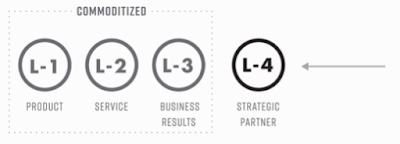“The concept of levels of value describes the way markets are being pulled in two different directions. Where no real value creation is necessary, where what is being purchased is a true commodity, prices are being reduced to the lowest point possible. Companies are competing by being super transactional, removing the friction of buying and lowering costs. This is the strategy of Level 1 and Level 2 value providers. It is important to note that when a company makes this decision, it is a strategic decision. Super transactional does not simply mean discounting or making pricing concessions. This is how these companies consistently compete.Qual é a direcção da sua empresa?
.
The opposite strategy is super relational. This is high trust, high value, high caring. This approach is the very opposite of super transactional, placing greater value on providing results, being proactive, developing customer intimacy, and having deep knowledge and expertise.
.
When decisions are complex, with many factors at play and many possible paths forward, relationships of value matter a great deal. This is the strategy of Levels 3 and 4, and because most B2B sales organizations have been creating Level 3, selling the tangible return on investment and solving their client’s existing problems to the point of its being a commodity, success in creating opportunities and acquiring and retaining clients requires Level 4. Level 4 is disruptive in that it allows you to compel change.
.
If you behave like you are super transactional, intentionally or unintentionally, you will be treated like a commodity. You will be an attractive alternative only to prospects who care mostly about price, even if they do so to their detriment. This is to be a vendor or supplier (two words that you should be horrified to ever hear your client utter when referring to you), not a trusted adviser (words that produce the sweetest “sound to your ears).
.
Alternatively, if you are super relational, you will attract companies and people who want better results. You will be interesting to people who are growth oriented and people who want to address their systemic challenges and threats and move their companies forward. Being super relational is what makes you a trusted adviser.”
Que indicadores segue?
Acha que a gestão requerida por uma direcção é a mesma que a requerida na outra direcção?
Acha que a cultura requerida por uma direcção é a mesma que a requerida na outra direcção?
Já pensou a sério nisto? Não?! Talvez seja isto o que lhe está a acontecer: "If you behave like you are super transactional, intentionally or unintentionally, you will be treated like a commodity."
Excerto de: Anthony Iannarino. “Eat Their Lunch”.






_-_Google_Art_Project_-_edited.jpg/1280px-Pieter_Bruegel_the_Elder_-_The_Tower_of_Babel_(Vienna)_-_Google_Art_Project_-_edited.jpg)
%2006.21.jpeg)












